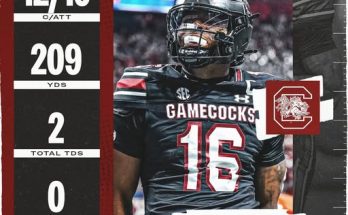Georgia Football Star Arrested on Felony Drug Charges in Shocking Offseason Incident
The Georgia Bulldogs football program finds itself embroiled in controversy once again after starting defensive tackle Tyrone Ingram was arrested early Tuesday morning on felony drug charges, according to Athens-Clarke County jail records. The 21-year-old junior, projected as a potential first-round NFL draft pick after this season, was booked into the county jail at 3:17 a.m. on charges of possession with intent to distribute marijuana and possession of a controlled substance (Alprazolam) following a traffic stop near campus. The arrest sends shockwaves through a program that has worked diligently to rebuild its reputation following several high-profile player incidents in recent years, and raises immediate questions about Ingram’s future with the team as Georgia prepares to defend its back-to-back national championships.
According to the police report obtained by local media, officers initiated the traffic stop after observing Ingram’s black Dodge Charger swerving between lanes on College Station Road near the university’s intramural fields. The arresting officer noted in the report that “a strong odor of marijuana was immediately apparent” upon approaching the vehicle, and that Ingram appeared “visibly nervous with shaking hands” during the initial interaction. A subsequent search of the vehicle allegedly uncovered approximately 1.5 pounds of marijuana separated into individual baggies, along with 27 pills identified as Xanax without a prescription. The report states Ingram initially claimed the substances belonged to “a friend” before declining to answer further questions without an attorney present.
University of Georgia athletic department officials released a terse statement mid-morning acknowledging they were “aware of the situation” and “gathering all pertinent information,” but declined further comment pending the ongoing legal process. Head coach Kirby Smart, known for his strict disciplinary policies, has not yet addressed the media but faces a difficult decision regarding one of his most talented defensive players. Team sources indicate Ingram has been immediately suspended from all team activities pending investigation, a standard protocol under Smart’s leadership. The timing couldn’t be worse for the Bulldogs, who open fall camp in just three weeks as they pursue an unprecedented third consecutive national title.
Legal experts consulted for this story suggest the charges could carry significant consequences beyond football. Georgia’s strict drug laws make possession with intent to distribute marijuana (over one ounce) a felony punishable by 1-10 years in prison, while the controlled substance charge adds another potential 2-15 year sentence. However, first-time offenders often receive plea deals involving probation and drug counseling rather than jail time, especially in cases involving non-violent crimes and a defendant with no prior record. Court records show Ingram has no previous criminal history in Georgia. His attorney, prominent Athens-based lawyer Michael Reynolds, released a statement asserting his client’s innocence and vowing to “vigorously defend against these allegations,” though he declined to specify what defense strategy might be employed.
The arrest has sparked heated debate among the Bulldog faithful, with reactions ranging from calls for immediate dismissal to pleas for patience until due process plays out. On social media platforms, the divide is particularly stark – some fans point to Ingram’s clean record and community service work with Athens youth programs as reasons for leniency, while others argue the serious nature of the charges demands swift action regardless of his on-field value. This tension reflects the larger conversation in college athletics about balancing second chances with accountability, particularly for star players at powerhouse programs.
Ingram’s teammates have largely remained silent publicly, though several players were seen entering the football facility earlier today for what sources describe as an impromptu team meeting called by veteran leaders. The locker room dynamic bears watching, as Ingram was considered a vocal leader on defense and his absence—whether temporary or permanent—would create both an emotional and strategic void. Junior linebacker Cade Jones, one of the team’s elected captains, briefly spoke to reporters after the meeting, stating only that “we’re handling this as a family” before departing.
From a football perspective, the potential loss of Ingram would deal a significant blow to Georgia’s vaunted defensive line. The 6’4″, 315-pound tackle recorded 7.5 sacks and 11 tackles for loss last season while routinely commanding double teams that freed up teammates. Defensive coordinator Will Muschamp’s scheme relies heavily on interior pressure, and while the Bulldogs boast impressive depth, few players possess Ingram’s combination of size, quickness, and technical refinement. Analysts suggest his absence could force Georgia to alter its defensive approach significantly if the legal situation isn’t resolved before the season opener against Clemson.
The incident also renews scrutiny of the broader culture within elite college football programs. Georgia has faced criticism in recent years for multiple player arrests, though Athletic Director Josh Brooks has pointed to declining incident rates since implementing new behavioral policies in 2021. A university spokesperson confirmed today that all Georgia athletes undergo mandatory drug education programs, including seminars with local law enforcement about state drug laws. However, critics argue these measures fail to address the underlying pressures and temptations facing high-profile college athletes, particularly those from disadvantaged backgrounds suddenly thrust into the spotlight.
As the legal process unfolds, the university faces competing pressures. On one hand, maintaining institutional control and upholding community standards demands serious consequences for serious offenses. On the other, the reality of big-time college football means star players often receive more leniency than their peers—an uncomfortable truth that has drawn criticism from faculty and student groups in the past. The school’s handling of this case will be closely watched not just by Bulldog fans, but by the entire college sports world, as programs nationwide grapple with similar incidents.
For Ingram, the arrest represents a potential turning point in what had been a storybook college career. The Mobile, Alabama native overcame childhood poverty to become one of the nation’s most recruited defensive linemen, often speaking openly about his desire to provide for his family through football. Now, instead of preparing for what many projected as an All-American season, he faces an uncertain future where his freedom and professional aspirations hang in the balance. His next court appearance is scheduled for August 15—one week before Georgia’s first preseason practice—though legal experts suggest the case could take months to resolve fully.
The coming days will reveal much about Georgia’s priorities and values as an institution. Will they stand by a talented player during his time of need, or make an example of him to deter future incidents? How will Smart balance his tough-on-discipline reputation with the practical realities of fielding a championship-caliber team? And perhaps most importantly, what does this say about the state of college athletics, where the pressure to win sometimes collides violently with the mission of educating young men? These are the difficult questions facing the Bulldog nation today—questions that no amount of on-field success can easily answer.
As the sun sets over Athens tonight, the iconic hedges of Sanford Stadium stand as silent witnesses to yet another chapter in the complex relationship between big-time college football and the society that both celebrates and scrutinizes it. The outcome of this case may fade from headlines eventually, but the larger conversation it sparks about accountability, second chances, and institutional responsibility in college sports shows no signs of ending anytime soon. For now, all eyes remain on the Athens-Clarke County legal system, Kirby Smart’s office, and a talented young man whose future—both on and off the field—hangs in the balance.



